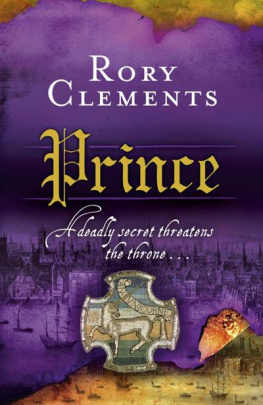Rory Clements - The Queen's man
Here you can read online Rory Clements - The Queen's man full text of the book (entire story) in english for free. Download pdf and epub, get meaning, cover and reviews about this ebook. genre: Detective and thriller. Description of the work, (preface) as well as reviews are available. Best literature library LitArk.com created for fans of good reading and offers a wide selection of genres:
Romance novel
Science fiction
Adventure
Detective
Science
History
Home and family
Prose
Art
Politics
Computer
Non-fiction
Religion
Business
Children
Humor
Choose a favorite category and find really read worthwhile books. Enjoy immersion in the world of imagination, feel the emotions of the characters or learn something new for yourself, make an fascinating discovery.
- Book:The Queen's man
- Author:
- Genre:
- Rating:3 / 5
- Favourites:Add to favourites
- Your mark:
- 60
- 1
- 2
- 3
- 4
- 5
The Queen's man: summary, description and annotation
We offer to read an annotation, description, summary or preface (depends on what the author of the book "The Queen's man" wrote himself). If you haven't found the necessary information about the book — write in the comments, we will try to find it.
The Queen's man — read online for free the complete book (whole text) full work
Below is the text of the book, divided by pages. System saving the place of the last page read, allows you to conveniently read the book "The Queen's man" online for free, without having to search again every time where you left off. Put a bookmark, and you can go to the page where you finished reading at any time.
Font size:
Interval:
Bookmark:
Rory Clements
The Queen's Man
Prologue
1578
Sir Francis Walsingham peered across the great hall of Grays Inn. Which one is he, Paul?
At the end of the far table, the one just standing up from the bench.
Walsingham picked out the young man. He was tall, perhaps six feet, with long hair and hooded eyes. Is he a good student?
He has wit enough, though he is not a university man; he came to me after his Barnards year.
He looks a little thin.
Well, he is not yet twenty. Give him time to grow. I certainly think him strong.
I like thin men. They slip through doors unnoticed.
Paul Ballater threw a sideways glance at his old friend and laughed. Walsingham could have been talking about himself, for he was gaunt and angular, with a dark, sunken face that spoke of too many hours hunched over documents and too little time for nourishment.
And what makes you think your Mr Shakespeare might be suited to my purpose?
As I told you, he has an inquiring mind and a keen sense of justice, but little love for the intricacies of the law. I think he is not made for dusty tomes.
He will not escape dusty tomes that easily. A hundred papers pass my desk each day. And he will need to learn languages and politics.
Walsingham watched as John Shakespeare clapped his fellow diner on the back and seemed to share a jest, for they both smiled, then he strode away across the echoing hall. Was this the man he was looking for? He needed an apprentice to learn every nuance of the war of secrets that must be waged if Elizabeth was to hold on to her throne. He needed a man of courage and honesty; rare qualities in the world of the intelligencer.
Try him, Frank. If you dont like him, send him back here. Ill make a barrister of him in time.
Do we know his family?
His father is a burgess of some standing in the town of Stratford-upon-Avon in Warwickshire.
Are they sound of faith?
I have no reason to believe otherwise.
Walsingham was silent for a few moments, then nodded. Very well, Paul. Talk to him. If he is amenable, send him to me at Seething Lane on the morrow. Let us see what stuff your Mr Shakespeare is made of.
Chapter One
1582
She was twenty-six; he was eighteen. They lay naked on a mattress made from hay with a covering of canvas that they had found on an old cart. Had stolen from a cart.
By their illicit bed stood a half-empty jug of cloudy cider. A light warm rain dripped through the rafters. Otherwise the only sound in this ancient ruin of a manor house was their breathing, growing softer with each moment.
The lovers had been coming to this place all summer long, believing that they were unlikely to be disturbed. It was known in the district as the Black House and fear kept people away, as it had done for more than two hundred years since the Black Death raged through its halls like the scythe of God. It was said that a family of ten had lived here with a dozen servants and retainers, and not a soul had survived. The building had been locked up and shunned ever since. Now it was overgrown and skeletal. A tall oak had grown in the middle of the great hall and much of the roof had crumbled, but the stone walls still survived, covered in a tangle of ivy and briar.
The house was largely forgotten. It stood three miles to the north of Stratford-upon-Avon; the park that once surrounded it was now dense woodland and the old walls were unseen, save by the occasional poacher or curious child.
The woman looked at her lover apprehensively. Initially, it had been his idea to come here, for he was not afraid of the place. He had told her that he first visited it seven years ago with another boy. His friend offered him a farthing to enter the ruin, so he had no option; he had to go in. He had won the coin from his friend and a badly gashed leg when a rotten board gave way beneath him. To his friend, the injury proved that the place was indeed accursed and haunted. But Will knew otherwise. He liked the house and had begun to come here alone, to read or think or merely to watch the sky.
And then, this spring past, he had brought her here. Together they had cleared a corner that offered enough shelter and a flat stone floor that would serve as a base for the straw mattress and that would not give way under their energetic couplings.
A drop of rain fell on his chest.
Summer is done, he said, looking up at the damp, grey September sky.
She kissed his face. She had a secret that she must tell and another that she would keep to herself. Tentatively, she took his hand down to her belly. Her flesh was warm, but she was nervous. She had been wondering how to tell him of her pregnancy. He had been besotted when this all started, exultant at having won the prize, the fairest young woman in the county, the one who had evaded the confines of marriage all these years. But how did he feel now, this boy, with summer gone and so much passion spent?
He allowed her to clasp his hand there beneath her own curling fingers, enjoying the quiet intimacy. At first he did not seem to comprehend the silent message she was trying to convey, but she held his hand to her soft mound all the harder and suddenly she sensed a tension. He turned to her and she met his gaze.
Are you. .?
She nodded. There, it was out now. No going back.
Is it certain? he said, raising himself on his elbows.
The sharpness of his movement alarmed her. Was he angry? I believe so, she said as evenly as she could. My flowers are three weeks late. Normally, they are as regular as the moon.
He said nothing, his face a puzzle. She wished he would say something, not merely look at her. Will. Oh, please say something. Then he took her in his arms. Perhaps he had seen the desperation in her eyes. God in heaven, what would he say? Would he run from her? He had spoken often enough of leaving Stratford and Warwickshire. Now, he might think he had even more reason to leave. To flee. .
They had both known the risk. She had been his teacher in love, and he the eager pupil. She had thought him grateful for such schooling. What man of eighteen would not? But now she noted the change in his demeanour. As though he were the master, and she the novice.
He pulled away from her and smiled, then kissed the tears from her cheeks. At last he picked up the fired-clay jar of cider, drank from it, then held it to her lips. He whispered in her ear words of love, the sorts of words that had wooed and won her; words that fell sweetly from his lips like honey from the comb.
The words and the cider warmed her heart, but they did not calm it. For there was still the other matter, the one she dared not confide in him. The secret that could kill her.
Chapter Two
Franois Leloup, doctor of medicine, and known this day as Seguin, walked beside the young Scot across the inner bailey or courtyard of Sheffield Castle. His journey from Normandy had been long and tiresome, riding a flea-bitten horse down pitted byways and peasant paths, all the time trying to avoid scrutiny. He felt dirty and unrested, despite a nights sleep at the local inn and a handsome dinner here within these ancient walls.
This castle was an abomination. The stench of an overflowing midden hung heavy and cloying in the air. With his one hand, he held a small silver pomander of musk and ambergris to his nose, but it did little to keep the smell from his wide nostrils. These English! How could they live like this?
Ahead of him, at the bottom of the steep flight of stone steps that must lead to the entrance of the castle keep where Mary was held, he saw half a dozen guards closing ranks. The guards were armed with ceremonial halberds, but the real weapons were at their belts: fighting short swords and loaded pistols. This was not merely for show. The Frenchman stopped and threw an inquiring glance at his young companion.
Font size:
Interval:
Bookmark:
Similar books «The Queen's man»
Look at similar books to The Queen's man. We have selected literature similar in name and meaning in the hope of providing readers with more options to find new, interesting, not yet read works.
Discussion, reviews of the book The Queen's man and just readers' own opinions. Leave your comments, write what you think about the work, its meaning or the main characters. Specify what exactly you liked and what you didn't like, and why you think so.








